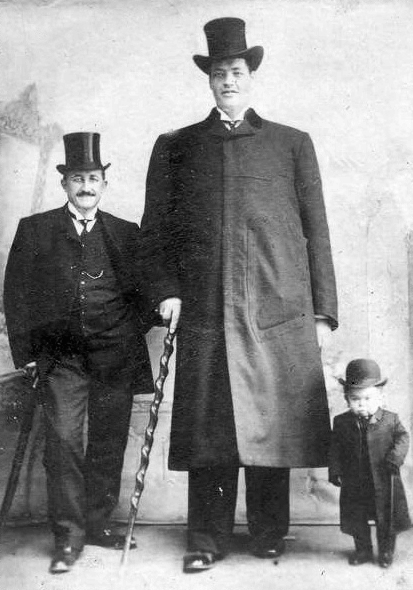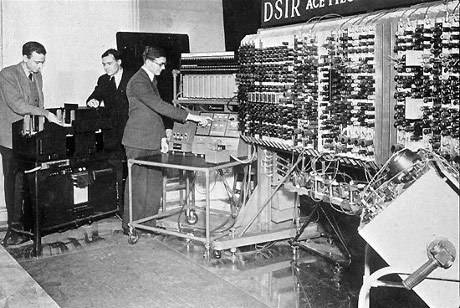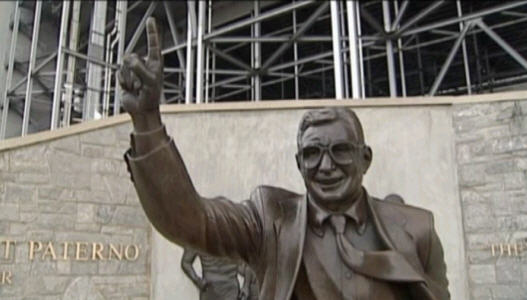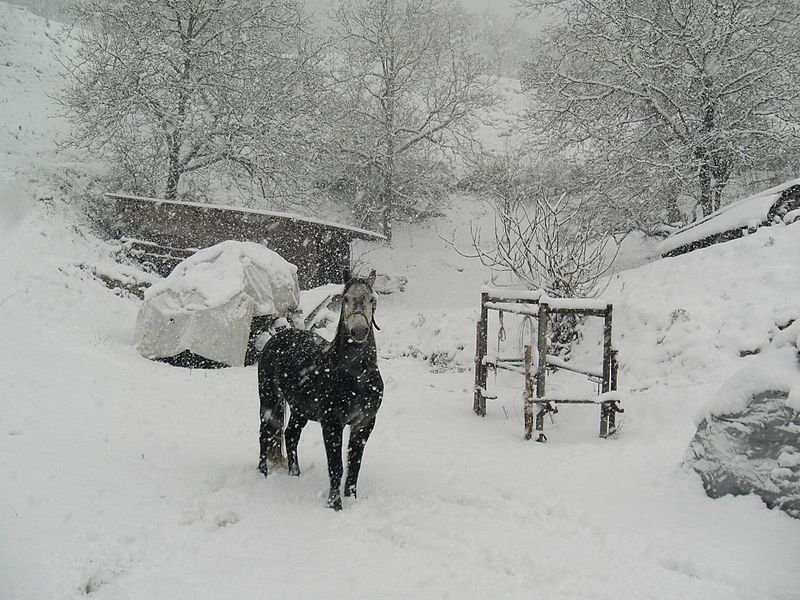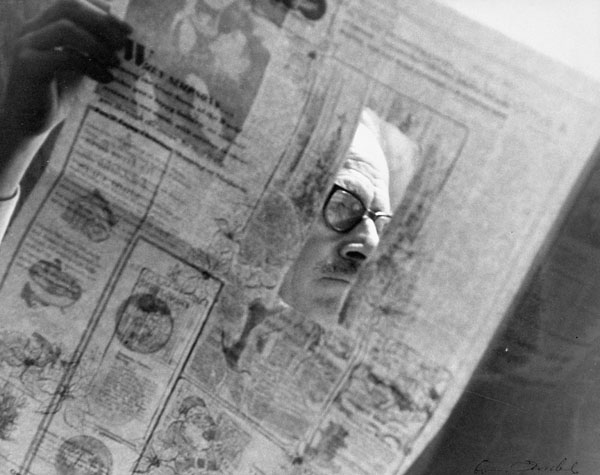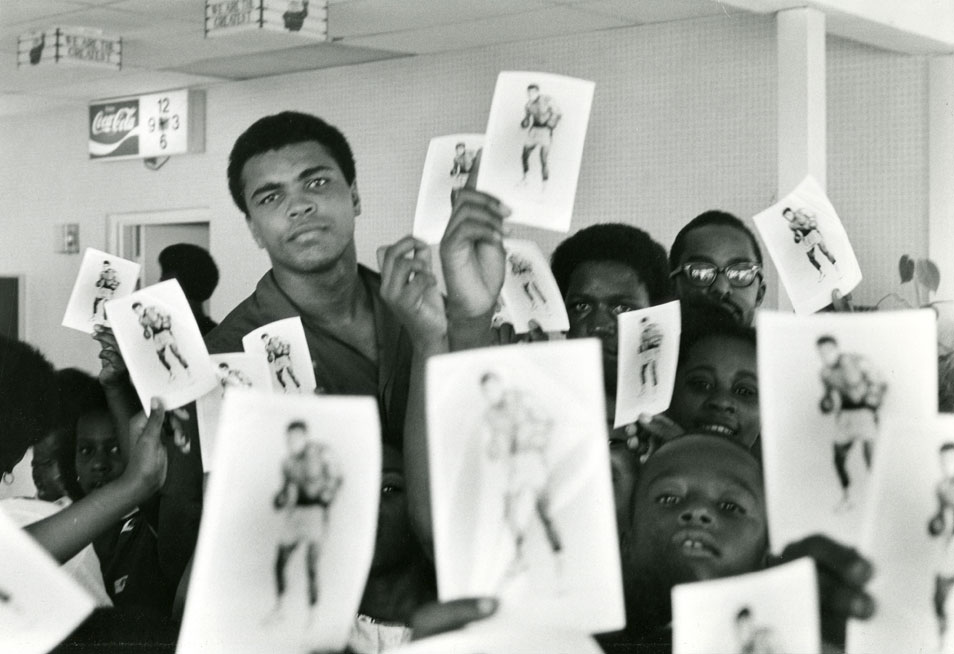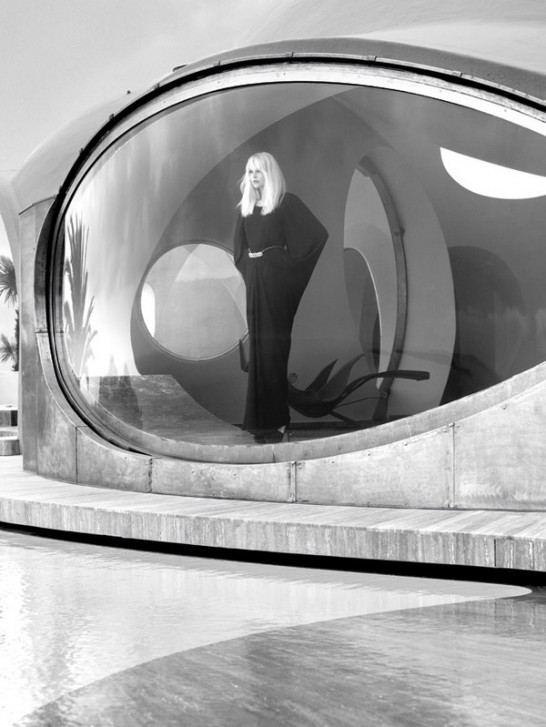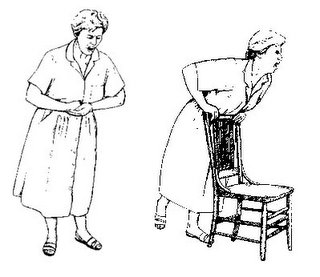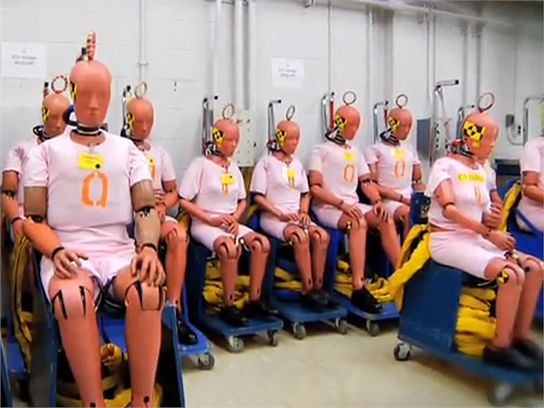I don’t know what became of Robert Olsen’s modernist purple cube furniture, but as this 1973 video demonstrates, it was really compact and adaptable.
You are currently browsing the archive for the Urban Studies category.
Tags: Robert Olsen
From the April 2, 1844 Brooklyn Daily Eagle:
“Among the passengers on board of the packet ship Yorkshire, just arrived, are a giant, standing nearly eight feet in his boots; a giantess, about seven feet in height, and a dwarf twenty-three inches tall, or thereabout, being three inches shorter than the famous Tom Thumb. The giant and giantess are man and wife, and will make their first appearance at Barnum’s Museum.”
The result of Greg Lindsay’s collaboration with John D. Kasarda, Aerotropolis: The Way We’ll Live Next, grew from a 2010 article the journalist wrote for Fast Company about New Songdo City, South Korea’s ambitious airport-centric, insta-city. The opening:
“Stan Gale is exultant. The chairman of Gale International yanks off his tie, hitches up his pants, and mops the sweat and floppy hair from his brow. He’s beaming like a proud new papa, sprung from the waiting room and handing out cigars to whoever happens by. Beckoning me to follow, he saunters across eight lanes of traffic toward his baby, delivered prematurely days before.
Ten years ago, Gale was a builder and flipper of office parks who would eventually become known for knocking down the Boston landmark Filene’s Basement and replacing it with a hole in the ground. But Gale’s fate began to change in 2001 with a phone call from South Korea. The Korean government had found his firm on the Internet and made an offer everyone else had refused. The brief: Gale would borrow $35 billion from Korea’s banks and its biggest steel company, and use the money to build from scratch a city the size of downtown Boston, only taller and denser, on a muddy man-made island in the Yellow Sea. When Gale arrived to see the site, it was miles of open water. He signed anyway.
New Songdo City won’t be finished until 2015 at least, but in August, Gale cut the ribbon on the 100-acre ‘Central Park’ modeled, like so much of the city, on Manhattan’s. Climbing on all sides will be a mix of low-rises and sleek spires — condos, offices, even South Korea’s tallest building, the 1,001-foot Northeast Asia Trade Tower. Strolling along the park’s canal, we hear cicadas buzzing, saws whining, and pile drivers pounding down to bedrock. I ask whether he’s stocked the canal with fish yet. ‘It’s four days old!’ he splutters, forgetting he isn’t supposed to rest until the seventh.
As far as playing God (or SimCity) goes, New Songdo is the most ambitious instant city since Brasília 50 years ago. Brasília, of course, was an instant disaster: grandiose, monstrously overscale, and immediately encircled by slums. New Songdo has to be better because there’s a lot more riding on it than whether Gale can repay his loans. It has been hailed since conception as the experimental prototype community of tomorrow. A green city, it was LEED-certified from the get-go, designed to emit a third of the greenhouse gases of a typical metropolis its size (about 300,000 people during the day). It’s an ‘international business district’ and an ‘aerotropolis’ — a Western-oriented city more focused on the airport and China beyond than on Seoul. And it’s supposed to be a ‘smart city,’ studded with chips talking to one another, designated as such years before IBM found its ‘Smarter Planet’ religion.”
••••••••••
A Cisco video about Songdo:
Tags: Greg Lindsay, John D. Kasarda, Stan Gale
People currently living under tyrants in the Middle East want political freedom and empowerment. But in free countries in the West, we want designer stuff. What we wouldn’t trade for it. We’re citizens acting as if we’re merely consumers. From David Wallace-Wells’ smart interview with Martin Amis in New York, a section about the London riots of 2011:
“Were you in London for the riots?
I wasn’t. As I recall, it was, as these things usually are, set off by a bit of heavy-handed policing. It’s interesting that there’s such a contrast between the police in America and there, in how they’re viewed by the working class, or whatever you want to call them—the proletariat, the many. In America, the policeman is a working-class hero. In England, the policeman is a working-class traitor. Lionel propounds this view himself—the police undertake to protect the rich man’s shilling. As if everyone’s raring to have a redistribution of wealth. That’s why there’s such violent names for the police in criminal England—they call them not only the filth, the filth, but also the puss. They’re the lowest of the low. When policemen go to prison in England, they have as bad a time as a pedophile.
The police in America are, to my senses, quite fascistic—you know, immediate end to all humor, end of all human contact; it’s a real assertion of authority in a way that’s very rare in England. In England, police are, softly softly, “Now, sir, come on, sir.” It’s a humoring voice, not an authoritarian one. I don’t understand the sparking incident. But, then, as the phrase is, it’s all off, then. When a riot starts, it’s all off—meaning, the law suspended. It’s also interesting they used social networking to get people around to certain malls where the police presence was small.
Also that they were gravitating towards malls at all.
Yeah. It was very sort of un-left-wing, in the sense that they all flooded into these sports-equipment shops and tried on all these trainers. A rioter doesn’t usually try things on. Or a looter—it was looting, really, rather than rioting.
But, I mean, what conclusions are people trying to draw from that? It’s just the sort of thing that happens every now and then. Very hard to see any kind of social protest in it. It was opportunistic, and cynical, I think. And I was horrified to learn some of the sentences that were being handed down, for people with no record, first-time offenders, deterrent sentences, exemplary sentences. So, you know, incoherent social spasm rather than anything one could draw conclusions from.
But I guess an expression of class frustration, too.
It’s not class anymore. It’s money. And for very good reason. Money is a much more fluid medium than class, and much more measurable, too, than class. It was a protest, if it was that, to any extent, against privation. It is the sort of society where—it’s not very rational—people look at fame and feel deprived if they haven’t got it, feeling that this is a basic, almost a human right, a civil right.”
••••••••••
Amis interviews Norman Mailer, 1991:
Paddy Chayefsky discussing Network, arguably America’s best film satire, with Dinah Shore in 1976.
See also:
I wholly disagree with L. Gordon Crovitz’s Wall Street Journal editorial “Who Really Invented the Internet?” The piece attempts to discredit the important role that government played in the nurturing of our dominant medium, trying to shift all the credit to the free market. That’s ideology masquerading as history. An excerpt:
“A telling moment in the presidential race came recently when Barack Obama said: ‘If you’ve got a business, you didn’t build that. Somebody else made that happen.’ He justified elevating bureaucrats over entrepreneurs by referring to bridges and roads, adding: ‘The Internet didn’t get invented on its own. Government research created the Internet so that all companies could make money off the Internet.’
It’s an urban legend that the government launched the Internet. The myth is that the Pentagon created the Internet to keep its communications lines up even in a nuclear strike. The truth is a more interesting story about how innovation happens—and about how hard it is to build successful technology companies even once the government gets out of the way.”
Tags: L. Gordon Crovitz'
That joker Alan Abel plays pranks that work because beneath the ridiculous set-ups and crude one-liners there’s an understanding of our desires and fears. In this ridiculous interview from basic cable decades ago, he satirized our wish for youth and immortality, marrying the emerging celebrity culture to new scientific possibilities. He pretended that he’d created a sperm bank in which only stars like John Wayne and Johnny Carson were allowed to make deposits. And he was going to cryogenically freeze a young woman and tour her body across America. Everyone would be famous and live forever.
See also:
Tags: Alan Abel
Need Personal Trainer to help get six pack (Far Rockaway )
hello my name is Jay and im 6’3 220 lbs waist 38 I need some one who doesn’t charge anything to help me get a six pack as fast as possible i need some one who goes to the gym often more than go to work if possible I need you to be a mentor in body sculpting to me I really don’t have any money so if willing to help me I’m trying to be a super model.
I posted last week about Elon Musk’s plan for a new, superfast mode of transport. One that runs on clean energy and can never crash. Here, at the 43:10 mark, he spends four minutes going into depth about the Hyperloop.
Tags: Elon Musk
I’m completely in favor of its removal, but there are statues of slave owners in Washington D.C. Large ones. And one of Christopher Columbus in Central Park. We have a tendency to be selective about our morality.
Tags: Joe Paterno
Like Albert Einstein’s brain, Vladimir Lenin’s corpse has done its fair share of traveling. Embalmed in 1924 at the behest of Joseph Stalin, Lenin’s leftovers have been considered differently during the many shifts in his homeland’s tortuous politics. Christopher Buckley, more than most, has had a close relationship with the remains. From his New York Times Op-Ed piece, “What’s a Body to Do?“:
“The saga of Lenin’s remains is a uniquely Russian story. His caretakers got drunk on the alcohol used in embalming Lenin’s corpse, and in one instance, one was caught groping the other’s daughter. There are group photos of them striking jaunty poses, as if they’ve gathered for a picnic.
And here was Khrushchev in 1956, growling, ‘The mausoleum stinks of Stalin’s corpse.’ Stalin was embalmed and laid out beside Lenin between 1953 to 1961, until Khrushchev said enough and ordered him buried beneath the Kremlin wall.
Lenin remains — Sleeping Beauty From Hell. Perhaps when his heir, President Vladimir V. Putin, is finished shipping combat helicopters to shore up his friend Bashar al-Assad of Syria he will have time to consider his minister of culture’s modest proposal.
Footnote: In 1991, when I was editing a publication for Forbes, I engaged in a hoax and briefly persuaded the world that the Russian government was preparing to auction off the body.
The story garnered quite a lot of play. A none-too-happy Russian interior minister denounced me for my ‘impudent lie’ and called it ‘an unpardonable provocation.’ (Which sort of made my day.)
But a number of readers of the magazine apparently didn’t get the memo that it was all a hoax. The Kremlin was deluged with offers.”
From the December 23, 1901 Brooklyn Daily Eagle:
“Not content with ordinary ski-running and jumping, the officers in the Swedish army, keen and good sportsmen as they are, have recently introduced a novel idea. They have taken up ardently a form of skiing in which they slide on skis behind trained horses that pull them at full gallop over the snow.”
Speaking of journalist C.P. Scott, here’s a passage from his famous 1921 essay, “A Hundred Years“:
“Character is a subtle affair, and has many shades and sides to it. It is not a thing to be much talked about, but rather to be felt. It is the slow deposit of past actions and ideals. It is for each man his most precious possession, and so it is for that latest growth of time, the newspaper. Fundamentally it implies honesty, cleanness, courage, fairness, a sense of duty to the reader and the community. A newspaper is of necessity something of a monopoly, and its first duty is to shun the temptations of monopoly. Its primary office is the gathering of news. At the peril of its soul it must see that the supply is not tainted. Neither in what it gives, nor in what it does not give, nor in the mode of presentation must the unclouded face of truth suffer wrong. Comment is free, but facts are sacred. ‘Propaganda,’ so called, by this means is hateful. The voice of opponents no less than that of friends has a right to be heard. Comment also is justly subject to a self-imposed restraint. It is well to be frank; it is even better to be fair. This is an ideal.”
Tags: C.P. Scott
There might not always be Broadway, but they’ll always be theater. Likewise they’ll always be journalism despite the traditional economic print model being flattened before our eyes. But how will news be delivered and supported? Guardian editor Alan Rusbridger doesn’t have the answers, but he identifies all the right questions in an interview at the Browser. The opening:
“Talking about the future of news, some people might question what the fuss is about. In a couple of clicks they can find all the news they need, and what’s more it’s free. What’s the problem, in a nutshell?
The main if not the only problem is the business model. Otherwise, everything’s wonderful. There’s never been an era with more and better information, and greater ease of creating, consuming and sharing it. It’s a golden age. But at the moment, the economics of it all have yet to settle down and be worked out. There’s going to be a giant shakedown, because too much is happening to be sustained along the lines of the past. So it’s a golden age in terms of what is being created, but it’s not yet a golden age in terms of how it is all going to be paid for. Some things are going to stop, some things are going to begin, and some things we can’t yet imagine will happen. Everything is in transition.
It’s a true cliché that a crisis is also an opportunity, for us to rearrange the lego blocks. You’ve quoted CP Scott, who in 1921, with the advent of the telegraph and the telephone, said: ‘Physical boundaries are disappearing… What a change for the world! What a chance for the newspaper!’ What chances are there for the newspaper today?
It’s of an order that Scott was talking about. That was a fantastic thing – a man in his eighties who could see that these new technological advances meant that the Manchester Guardian would have access to, and would be able to distribute, news at a speed and with a range that was unimaginable when he started being editor. The same thing was true with me. When I became editor [in 1995], it was essentially a print product. But now [with the website] we’ve been catapulted into global reach and influence.”
Tags: Alan Rusbridger
I think Muhammad Ali in his prime would have beaten Joe Louis in his. But legendary trainer Cus D’Amato, who was still to mentor Mike Tyson down the line, argued in favor of the “Brown Bomber” when he and Ali debated the point in 1970, during the uncrowned champ’s Vietnam Era walkabout.
Tags: Cus D'Amato, Muhammad Ali
The opening of a 1992 New York Times article by Peter H. Lewis that foresaw smartphones, although it didn’t quite get that the devices would be for the masses:
“Sometime around the middle of this decade no one is sure exactly when — executives on the go will begin carrying pocket-sized digital communicating devices. And although nobody is exactly sure what features these personal information gizmos will have, what they will cost, what they will look like or what they will be called, hundreds of computer industry officials and investors at the Mobile ’92 conference here last week agreed that the devices could become the foundation of the next great fortunes to be made in the personal computer business.
‘We are writing Chapter 2 of the history of personal computers,’ said Nobuo Mii, vice president and general manager of the International Business Machines Corporation’s entry systems division.
How rich is this lode? At one end of the spectrum is John Sculley, the chief executive of Apple Computer Inc., who says these personal communicators could be ‘the mother of all markets.’“‘
Tags: Andrew Grove, Nobuo Mii, Peter H. Lewis
From “The Future Will Seem Normal“ at the Next Big Future,” Brian Wang’s new post about Earth forty years from now, which is interesting if very accelerated and sci-fi-ish:
“I do not see world government as inevitable (over the next 40 years for sure). But we are seeing this extra layer getting more powers. Trade organizations and treaties. But the UK and China leadership are smart enough to not give up currency sovereignty. They know the game that Germany and France are running.
Long term as we expand out into the solar system then sure Earth could have its own government, but there will still be the layers below. Not sure how it would all split out – like US federal versus states versus local. Or Canada – federal v provinces.
I see a lot more power vesting in the cities. I see mega cities forming. Especially with Sky city – factory mass produced skyscrapers at about ten times less cost and high speed transportation (high speed rail in China and perhaps low pressure or vacuum trains at higher speeds and high energy efficiency, the US could go pocket airports, robot electric cars, and small planes, beamed power could make that work.)
You could have 50 major cities in the 50-300 million pop range. Say 7 in China, 3 in the 200-400 million range and 4 in the 50 million range. Similar number in the US but smaller populations.”
Tags: Brian Wang
I NEED AN HONEST OPINION (Downtown)
I’m writing a book and I just want people’s opinion of a few of the stories …enjoy!
TRUE UNTOLD STORIES OF THE MAN THAT WALKS HIS BIKE
Preface
My Uncle Hyde has provided us with a wealth of crazy stories over the years. Whether it be falling asleep in the middle of the road or raising a hog in his house, he always manages to create unnecessary drama. The book’s title comes from my uncle being known all over town as the guy that walks his bike. Every time you see him he is walking the bike. The only time he rides his bike is down the hills. It’s an inside joke with our family that the bike is his GPS navigation and it knows how to make its way back home.
The stories about Uncle Hyde, known as “Bloopy” by family and friends, are all true events that I have witnessed or was told about by several people. Some of these stories will shock you or make you laugh, other stories will make you feel sad or upset you.
Welcome to my world. . .. . .
Despite everything in this book, I love my uncle to death. Alcoholism is a disabling, addictive disorder that can take over one’s life. I just wanted to share these stories to show what it’s like to deal with an alcoholic individual. At the time of these stories I was upset; but now, I can sit back and think about some of the things he has done and laugh about them. I’m not trying to bash my uncle; when he is sober, he is a normal person (almost), not that you would call him a saint.
I think the stories hit home in many families, especially those who deal with alcoholism. They describe the emotional, verbal, and at times the physical altercations that a person’s family may endure. I know that many of you can relate to the craziness that addiction can bring to a family; if not, may this book provide you with much entertainment and laughter.
Chapter One: Our Shoes are Wet
Back in the early 90’s, my brother and I were ten and eleven years old. One day, us kids and Uncle Hyde decided we wanted to get out of the house and enjoy the August weather. My brother and I wanted to go swimming, so my uncle said he would take us to Twin Lake, a popular weekend swimming spot. While we gathered up our swimming clothes, we thought about his drinking problem. By that age, we had already learned that for him, consuming vodka was a recipe for something to go terribly wrong.
I told him “Hey, I don’t want to go if you’re going to be drinking”.
He responded, “Don’t worry about what grown folks do, I haven’t had a drink all day!”
Instead of driving, we decided to ride our bikes the three miles from the house to the lake. Before we left, I checked to make sure he didn’t have a stash of liquor to take on the ride. Soon, we were on our bikes and heading up and down the hills of Highway DD. In thirty minutes, we could see the lake through the trees, a bright sun reflecting on the water. After sitting our bikes and shoes by a tree at the front entrance, we ran and jumped in the lake.
Twin Lake was quite crowded that day with families, groups of kids, and a few young couples. Everyone was laughing, joking having a good time. After about 15 minutes of splashing around, I looked out the corner of my eye and noticed Bloopy grabbing drinks from a couple of the other families. Not surprisingly, an hour later he is drunk and can barely stand up. My brother and I get out of the lake to dry off and here he comes, “Yawl ready to go?”
By his slurred words, I knew right then and there he wouldn’t be able to make it home, so I called my grandmother to come and get us. Of course, no one answered the phone, so we left a message to tell her the situation. We go back in the lake and play for a couple of more minutes before we get out to fetch to our bikes and shoes.
We are shocked to see Bloopy standing over our shoes pissing on them. We stand there in amazement wondering what the hell he was thinking. Mad as hell, we run up there and start yelling at him, “We can’t ride our bike without shoes!”
Bloopy said, again in his slurred voice, “Oh, I didn’t see them there. Rinse them off, yawl be alright.”
By this time, Grandma was pulling up in her red Buick Lesabre. After we told her what happened, she got out of the car and started cursing him out. We loaded up our bikes in the trunk and hopped in the back seat, just laughing and watching him get cursed at. After this tongue lashing, she told him, “I’m taking the kids home; you know your way back”.
After that incident we never went back to Twin Lake again.
Chapter 2: There has been a Death in the Family
For some reason people like to give my Uncle Bloopy free things. One October morning, I was lying down in bed relaxing when I heard a truck pulling into the driveway. I looked out the window and saw my uncle in the passenger seat. He jumped out, went to the back of the truck, and started to pull a large cage off the truck bed. In the cages were chickens of all different shades. Instantly, I think to myself, “What the hell is he going to do with those chickens?”
I quickly went outside and asked him why he was bringing those chickens to the house.
He told me, “Mind your business, these are my pets.”
I respond, “You can barely feed yourself, let alone some dirty chickens!”
He unloaded the cage and carried the chickens around to the back of the house. All together there were about 6 chickens. The guy in the truck said he wanted his cage back and pulled off. Bloopy didn’t even have any type of shelter built for the chickens yet. A few minutes later, I looked out in the backyard and he had these huge cardboard boxes trying to build a fence of some sort. In disbelief, I went out there to tell him that the chickens were going to get loose. Ignoring my warning, he put the chickens in this so- called shelter.
We went in the house and not even 10 minutes later the chickens were loose running around the backyard. He said, “They aren’t going to go anywhere!”
Early the next morning, I woke up and heard the chickens in the front yard. Walking out onto the front porch, I stepped in chicken poop and it was all over the bottom of my house slippers! Poop was all over the porch and I am pissed!
Immediately, I went around the house to the basement door where he lives and told him to get the chickens and clean up their mess. I am disgusted by these chickens!! After scolding him, I went back in the house to forget about the chickens.
About a week later, “Mildred” is the last chicken remaining that hasn’t been eaten alive by coyotes or wandered off. Late one night, I heard this weird sound in the backyard. Not thinking anything of it, I turned over and went back to sleep.
The next morning, my uncle came up the stairs with his head down and said, “There has been a death in the family. This afternoon we will be having funeral arrangements for Mildred.”
My mother and I started laughing because the look on my uncle’s face was so serious.
He said that the possum got a hold of the chicken last night. So, the strange sound I heard was in fact the demise of Mildred. Half-an-hour later, he took Mildred out of the cage and buried her in the backyard. We went on about our day.
Late that night, I woke up to a loud popping noise and I heard Bloopy saying, “I got you!” along with this popping noise.
I jumped up to look out the window and I saw him shooting something in the cage. He was repeating the same thing over and over again. His words were “I got ya for killing Mildred!”
The next day he came upstairs and said that he killed the possum that killed Mildred. Being the smart mouth person I am, I said,” Of all the possums in the woods, that could have been a sibling of the possum that killed Mildred!”
Chapter 3: Who ate my squirrel?
One cool Saturday afternoon, my cousin Evan and I were riding around town with grandma running errands. Evan was in the front seat and I was in the back. On our way back home we had the windows down listening to church music. The only station my grandma ever listened to is 1460am KIRL radio which played spiritual music nonstop. She never wanted to hear the “bumpity bump music” as she called it. We had our hands out the window waving them up and down to the music. Suddenly, I hear grandma say “ooh!”; then, we felt a bump in the tires.
I thought, “What the hell, what did she hit and why is she stopping?”
Grandma says,” I think I got it!”
Evan and I asked, “What did you run over grandma?”
Backing the car up, she said, “It’s a squirrel, Nat go get it.”
I answered back, “Huh”?
“Girl go pick up that squirrel before another car comes”.
My face all frowned up, I hopped out of the back seat and started looking for the squirrel. What I saw made me sick to my stomach. The furry critter was laying there twitching and still alive! I yelled, “Grandma, it’s still alive!”
She hollered back, “It won’t be for long, because I’m going to eat it!”
I ran back in the car and told her, “No way, I ain’t touching it”.
She turned toward Evan with a stern look and without even saying a word, he knew to go get it. While I watched from the back window, my cousin picked the squirrel up by the tail.
I asked grandma where she was going to put it.
“In the back seat with you”, she answered.
I started to scoot over as Evan was walking towards the car. He swung the door open and acted like he was going to throw it on me. I yell, “Quit Evan”! He threw the squirrel on the back passenger side floor and hopped back in the front seat. I sat there watching the squirrel twitch the rest of the ride home.
As soon as we arrived home, I ran in the house so that I didn’t have to look at the squirrel anymore. Evan and grandma grabbed the squirrel and our bags from the grocery store. While I helped put all the groceries away, I noticed that they just put the squirrel in the kitchen sink. Soon, my grandma began to clean and skin the squirrel. I was absolutely repulsed to see this, so I went in the living room with the rest of the family that was there which was Evan, Rita, Sandy, Bloopy.
Grandma peeped around the corner and hollered, “Hey, I don’t want anyone to eat my squirrel”!
We all said, “Yes ma’am!” and resumed watching TV.
Later that night, about the time we were all getting ready for bed, I went to the fridge to get some ice water. Lo and behold, that damn squirrel is in the freezer. I just slammed the fridge and went to bed.
In the middle of the night, I got very thirsty, and on my way to the kitchen I saw my uncle going down the steps with the squirrel. I scolded him, “Oooohhh grandma gonna get you”!
“Go on back to bed”, he told me.
The next morning, we are getting ready for church when I hear grandma yell, “Who ate my squirrel”?
Instantly, everybody ran into the kitchen laughing. She asked, “Bloopy, Sandy, which one of yawl ate my squirrel”?
Bloopy automatically pointed at Sandy and I just stood there shaking my head. “Grandma, last night I saw Bloopy taking the squirrel downstairs”.
He looked at me and stuck his tongue out; automatically, I did it back to him.
“Why you eat my squirrel? I was going to eat that after church”?
Bloopy just shrugged his shoulders and said, “I was hungry”.
Believe it or not, he was sober this time. This was just a classic case of orneriness.
Tags: Uncle Bloopy
At Foreign Policy, Vivek Wadhwa of Singularity University hits back at the idea that China is manufacturing America into the ground. Quite the contrary, he argues that manufacturing jobs are returning to the U.S. because of our superior knowledge of AI, though many of the tasks will be handled by robotic hands rather than human ones. A note in the article about the coming personalization of even large-scale products:
“Neil Jacobstein, who chairs the AI track at the Silicon Valley-based graduate program Singularity University, says that AI technologies will find their way into manufacturing and make it ‘personal’: that we will be able to design our own products at home with the aid of AI design assistants. He predicts a ‘creator economy’ in which mass production is replaced by personalized production, with people customizing designs they download from the Internet or develop themselves.
How will we turn these designs into products? By ‘printing’ them at home or at modern-day Kinko’s — shared public manufacturing facilities such as TechShop, a membership-based manufacturing workshop, using new manufacturing technologies that are now on the horizon.” (Thanks Browser.)
Tags: Neil Jacobstein, Vivek Wadhwa
Paypal founder, Tesla kingpin and private-sector space pioneer Elon Musk has a vision for the future of travel, and it doesn’t require wheels or wings. From Megan Garber at the Atlantic, Musk briefly describing his vision:
“This system I have in mind, how would you like something that can never crash, is immune to weather, it goes 3 or 4 times faster than the bullet train… it goes an average speed of twice what an aircraft would do. You would go from downtown L.A. to downtown San Francisco in under 30 minutes. It would cost you much less than an air ticket than any other mode of transport. I think we could actually make it self-powering if you put solar panels on it, you generate more power than you would consume in the system. There’s a way to store the power so it would run 24/7 without using batteries. Yes, this is possible, absolutely.”
Tags: Elon Musk, Megan Garber
A 1958 concept car that was a transformer of sorts, all at the push of a button.
Paddy Chayefsky, that brilliant satirist, holding forth spectacularly on the Mike Douglas Show in 1969. It starts with polite chatter about the success of his script for Marty but quickly transitions into a much more serious and futuristic discussion. The writer is full of doom and gloom, of course, during the tumult of the Vietnam Era; his best-case scenario for humankind to live more peacefully is a computer-friendly “new society” that yields to globalization and technocracy, one in which citizens are merely producers and consumers, free of nationalism and disparate identity. Well, some of that came true. All the while, he wears a fun, red lei because one of his fellow guests is Hawaii Five-0 star Jack Lord. Gwen Verdon, Lionel Hampton and Cy Coleman share the panel.
Chayefsky joins the show at the 7:45 mark.
Tags: Jack Lord, Mike Douglas, Paddy Chayefsky
From the March 2, 1898 Brooklyn Daily Eagle:
“San Francisco, Cal.–Captain G.E.D. Dimond, who will be 102 years old on May 1, is about to start on a pedestrian trip to New York. He helped to build the Erie Canal and was formerly United States Quartermaster at St. Louis. He has never married because his intended bride died in his arms at a ball given in honor of President Polk.”
Tags: Captain G.E.D. Dimond, James Polk
The opening of “The Strange Neuroscience of Immortality,” Evan R. Goldstein’s odd and fascinating new Chronicle article about the ad infinitum view of life:
“In the basement of the Northwest Science Building here at Harvard University, a locked door is marked with a pink and yellow sign: ‘Caution: Radioactive Material.’ Inside researchers buzz around wearing dour expressions and plastic gloves. Among them is Kenneth Hayworth. He’s tall and gaunt, dressed in dark-blue jeans, a blue polo shirt, and gray running shoes. He looks like someone who sleeps little and eats less.
Hayworth has spent much of the past few years in a windowless room carving brains into very thin slices. He is by all accounts a curious man, known for casually saying things like, ‘The human race is on a beeline to mind uploading: We will preserve a brain, slice it up, simulate it on a computer, and hook it up to a robot body.’ He wants that brain to be his brain. He wants his 100 billion neurons and more than 100 trillion synapses to be encased in a block of transparent, amber-colored resin—before he dies of natural causes.
Why? Ken Hayworth believes that he can live forever.
But first he has to die.
‘If your body stops functioning, it starts to eat itself,’ he explains to me one drab morning this spring, ‘so you have to shut down the enzymes that destroy the tissue.’ If all goes according to plan, he says cheerfully, ‘I’ll be a perfect fossil.’ Then one day, not too long from now, his consciousness will be revived on a computer. By 2110, Hayworth predicts, mind uploading—the transfer of a biological brain to a silicon-based operating system—will be as common as laser eye surgery is today.”
••••••••••
“Thousands frozen, and pets too”:
Tags: Evan R. Goldstein

